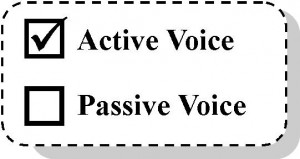
Passive voice weakens your writing. It obscures responsibility for action.
Those who learn English as a second language struggle to make sense of the many ways in which Americans use passive verb constructions in everyday speech. It often finds its way into our writing. Rarely is the writer conscious of this problem in their writing.
Passive voice is used by victims. Instead of actors, they are acted upon.
Let me help you understand passive voice and how you can get rid of it in your writing.
 “The boy was hit by the bus.” Passive. The boy is the subject of this sentence. He is the passive recipient of action. The responsible party for the vehicular accident ends up an object in the sentence instead of an actor. The focus is on the victim, not on who or what caused the crash.
“The boy was hit by the bus.” Passive. The boy is the subject of this sentence. He is the passive recipient of action. The responsible party for the vehicular accident ends up an object in the sentence instead of an actor. The focus is on the victim, not on who or what caused the crash.
Who did what to whom? “The bus hit the boy.” Active voice. Notice the different grammatical sentence structure. Subject-verb-object. The subject is the bus. The bus acts upon the direct object, the boy. The readers’ sympathies still lie with the boy; often intended by the writer of a passively constructed sentence. The action and agency, however, are front and center. The reader can see the bus crash into a boy more easily with the active verb of “hit.” Responsibility for the action is clear.
See if you can change these 10 sentences into active voice.
 The transcript was stamped with a seal of approval by the registrar.
The transcript was stamped with a seal of approval by the registrar.- Grant recipients were notified of their awards by phone call and those who did not receive a grant got their rejection letters in the mail from the foundation.
- A time-out was called by the mother of unruly toddlers.
- The lessons were learned quickly but they were forgotten even faster by the Spanish students.
- Eppie was raised by her elderly grandmother.
- Several homes were damaged by winds from the tornado.
- “A Tale of Two Cities” was written by Charles Dickens
- I was insulted by the mayor’s statement.
- Spiders were avoided by Miss Muffett.
- The lettuce was picked, washed, and bagged by summer interns.
- The registrar stamped the transcript with a seal of approval.
- The foundation notified grant recipients by phone call and mailed rejection letters to those who did not receive a grant.
- The mother of unruly toddlers called a time-out.
- The Spanish student learned lessons quickly and forgot them even faster.
 Her elderly grandmother raised Eppie.
Her elderly grandmother raised Eppie.- Winds from the tornado damaged several homes.
- Charles Dickens wrote “A Tale of Two Cities.”
- The mayor’s statement insulted me.
- Miss Muffett avoided spiders.
- Student interns picked, washed, and bagged the lettuce.]

Can you believe that an editor once chastised me for using the active voice too much? It made my text sound “too aggressive.” But that was for an academic journal — and a different publishing world.
I’d like to think the passive voice has its place in the rhythm and flow of language. If prose is an undulating ocean, the occasional appearance of the passive voice in the troughs might exentuate the peaks.
Yes I can believe it. One of the features of “academese” is passive voice.
I missed one but passive voice has always driven me crazy
Bravo! Let’s call it an A for active.
I got them all right! You taught me well. Now I need to get rid of my exclamation marks habit.
I finally took the test. I got each one correct. You heightened my awareness. I also need to cut back on exclamation marks. It is difficult. The world excites me.
A+ Your prose pops with active voice.
I love this lesson. I need to be reminded often, so need to find a way to remind myself, dammit. ( I used the word “dammit” to express vehemence without using the dreaded exclamation point.)